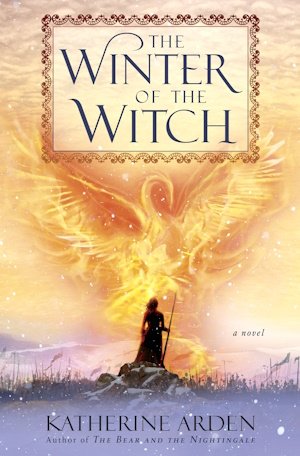“But,” she finished, “it was for my sake that the Bear was freed; I must see him bound anew.”
“The Bear’s amusements do not concern you. He was long a prisoner; don’t you think he deserves a little sunlight?”
“He just tried to kill me,” said Vasya acidly. “That is one amusement that concerns me.”
“You cannot stand against him. You are too young, and you have seen the dangers of too much magic. He is the cleverest of the chyerti. If I had not come, you would have died.” One withered hand reached out and caught Vasya’s. “Stay here and learn, child.”
“I will,” said Vasya. “I will. If the Bear is bound then I will come back and be your heir and learn. But I must see my family safe. Can you help me?”
The old woman withdrew her hand. Hostility was winning out over the hope in her face. “I will not help you. I am steward of this lake, these woods; I care not for the world beyond.”
“Can you at least tell me where the winter-king is imprisoned?”
asked Vasya.
The woman laughed. Really laughed, throwing her head back with a cackle. “Do you think his brother will have just left him lying, like a kitten he forgot to drown?” Her eyes narrowed. “Or are you just like Tamara? Choosing a man over your own kin?”
“No,” said Vasya. “But I need his help to bind the Bear again. Do you know where he is?” Despite her efforts at calm, a hard edge was creeping back into her own voice.
“Not on any of my lands.”
Lady Midnight was still standing in the shadows, listening intently.
Baba Yaga has three servants, riders all: Day, Dusk, and Night, that was how the story went. “Nevertheless,” said Vasya, “I am going to find him.”
“You don’t know where to start.”
“I am going to start in Midnight,” said Vasya shortly, with another glance at the midnight-demon. “Surely if it includes every midnight that ever was, one of them contains Morozko in his prison.”
“It is a land so vast your mind cannot understand it.”
“Will you help me then?” Vasya asked again, looking into the face that was the mirror of her own. “Please. Babushka, I am sure there is a way.”
The woman’s mouth worked. She seemed to hesitate. Vasya’s heart leaped with sudden hope.
But then the witch turned stiffly away, jaw set. “You are as bad as Tamara, as bad as Varvara, as bad as either of those wicked girls. I will not help you, fool. You will only get yourself killed, and for nothing, after your precious winter-king went to such lengths to see you safe.” She was on her feet. Vasya was too.
“Wait,” she said. “Please.” Midnight stood motionless in the darkness.
Furiously the old woman said, “If you think better of your foolishness, come back and perhaps I will reconsider. If not—well, I let my own daughters go. A great-granddaughter should be even easier.”
Then she stepped into the darkness and was gone.
14.
Vodianoy
VASYA WISHED SHE COULD CRY. Part of her soul yearned after her great-grandmother, as it yearned after the mother she’d never known, after her dead nurse, and the elder sister who’d gone away so young. But how could she live quietly in a land of magic while the Bear was loose, her family in danger, the winter-king left to rot?
“You are too alike,” said a familiar voice. Vasya raised her head.
Midnight slipped out of the shadows. “Rash. Heedless.” The moonlight kindled the chyert’s pale hair to white fire. “So, you mean to seek the winter-king?”
“Why are you asking?”
“Curiosity,” said Midnight, lightly.
Vasya didn’t believe her. “Are you going to tell the Bear?” she asked.
“Why should I? He will only laugh. You cannot get Morozko out.
You will only die trying.”
“Well,” said Vasya, “you would rather I died, it seems, judging by our last meeting. Why not tell me where he is, and I’ll be dead the sooner?”
Polunochnitsa looked amused. “It wouldn’t do any good if I did.
Getting somewhere in Midnight is not so simple as knowing where
you mean to go.”
“How do you travel by midnight then?”
Polunochnitsa said softly, “There is no north in Midnight, no south. No east or west; no here or there. You must only hold your destination in your mind and walk, and not falter in the darkness, for there is no telling how long it will take to get where you wish to go.”
“Is that all? Why did Varvara make me touch an oak-sapling then?”
Polunochnitsa snorted. “A little that one knows, but she does not understand. Affinity makes it easier to travel. Like calls to like. Blood calls to blood. It is easiest to go to your own kin. You couldn’t reach the tree by the lake alone because you used a weak affinity—oak-tree to oak-tree.” Her expression went sly. “Perhaps it won’t be hard for you to find the winter-king, little maiden. There is an affinity there, surely. After all, he loved you enough to yield up his freedom.

























